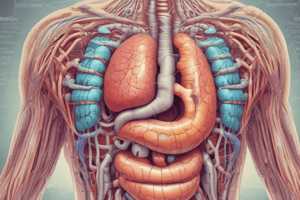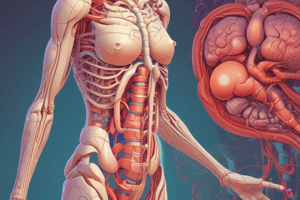Podcast
Questions and Answers
Quale es un exemplo de un del passos in le evalutation gastrointestinal?
Quale es un exemplo de un del passos in le evalutation gastrointestinal?
- Inspection (correct)
- Electrocardiogramma
- Biopsia
- Analyses de sanguine
Qual aspecto vital es includite in le historia de un patiente durante un evalutation de problemas gastrointestinal?
Qual aspecto vital es includite in le historia de un patiente durante un evalutation de problemas gastrointestinal?
- Hobbies
- Preferentias de color
- Historia familial (correct)
- Discriminar le animales domestic
Que implica le auscultation durante un examination gastrointestinal?
Que implica le auscultation durante un examination gastrointestinal?
- Percuter le abdomine
- Ascoltar le sono abdominal (correct)
- Palpar le abdomine
- Appreciar le color de pelle
Quales es un componente que usualmente es includite in le historia social del patiente?
Quales es un componente que usualmente es includite in le historia social del patiente?
Que vole dicer si un medico face un palpation abdominal?
Que vole dicer si un medico face un palpation abdominal?
Que typicamente es examinate durante un evalutation gastrointestinal?
Que typicamente es examinate durante un evalutation gastrointestinal?
Durante le evalutation gastrointestinal, que typo de historia se prende in consideration?
Durante le evalutation gastrointestinal, que typo de historia se prende in consideration?
Qual del sequente es le componente de inspection in le contento abdominal?
Qual del sequente es le componente de inspection in le contento abdominal?
Qual componente del sono abdominal es associate con le evalutation gastrointestinal?
Qual componente del sono abdominal es associate con le evalutation gastrointestinal?
Qual del procedura es usate durante le evaluation gastrointestinal?
Qual del procedura es usate durante le evaluation gastrointestinal?
Flashcards
Historia (Gastrointestinal)
Historia (Gastrointestinal)
Collection de informationes re le patiente, includente le problema actual, symptomas, historia familial, e factores social.
Inspection (GI)
Inspection (GI)
Examination visual del abdomine pro distension, cicatrices, o altere anormalitates.
Auscultation (GI)
Auscultation (GI)
Audir le sono intestinal pro evalutar le motilitate.
Palpation (GI)
Palpation (GI)
Signup and view all the flashcards
Study Notes
- Gastrointestinal (GI) disorders involve a comprehensive assessment process
- This assessment includes gathering the patient's history and performing a physical examination
- The information gathered will help healthcare professionals diagnose and manage GI conditions effectively
History
- A thorough history is crucial for identifying potential GI issues
- Includes details about the current issue, symptoms, family history, and social history
Current Issue
- Details regarding the patient's primary reason for seeking medical attention should be collected
- Important to determine the onset, duration, and progression of the current issue
- Specific questions should be asked regarding what makes the issue better or worse
Symptoms
- Focuses on the patient's experienced symptoms
- Should include detailed questions about abdominal pain, nausea, vomiting, diarrhea, constipation, bloating, and any other relevant complaints
Family History
- Involves gathering information about any family history of GI disorders, such as inflammatory bowel disease (IBD), colorectal cancer, or celiac disease
- This helps identify potential genetic predispositions or familial patterns
Social History
- Addresses lifestyle factors that can impact GI health
- Smoking, alcohol consumption, dietary habits, stress levels, and medication use should be discussed and noted
- These factors can contribute to or exacerbate GI symptoms
GI Assessment
- The GI assessment involves inspection, auscultation, and palpation techniques
- These components are essential for evaluating the patient's abdominal region
Inspection
- Involves visually examining the abdomen for any abnormalities
- Contour, symmetry, skin changes (scars, striae, or distension should be noted
- Any visible pulsations or masses should be recorded
Auscultation
- Auscultation is performed by listening to bowel sounds in all four quadrants of the abdomen
- Characteristics such as presence, frequency, and intensity of bowel sounds are noted
- Absent or abnormal bowel sounds may indicate underlying GI pathology
Palpation
- Involves gently pressing on the abdomen to assess for tenderness, masses, or organomegaly
- Light palpation is performed first to identify areas of discomfort or guarding
- Deep palpation is then used to evaluate abdominal organs and detect any masses or abnormalities
Studying That Suits You
Use AI to generate personalized quizzes and flashcards to suit your learning preferences.




